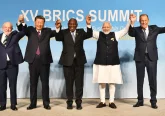 Diasporas and other transnational communities have become particularly useful case studies for scholars interested in stretching and challenging mainstream conceptions of citizenship. It is now widely accepted that for many people around the world, physical location and formal legal citizenship may not be the most salient forms of social, political or economic affiliation. As the process of globalization continues to expand, more and more people find themselves in one place, while their lives are structured and oriented by connections to one or several other places. Some of these ‘places’ are other nation states, such as an ancestral country of origin. However, many such ‘places’ exist extraterritorially as abstract yet powerful expressions of identity, community, and belonging.
Diasporas and other transnational communities have become particularly useful case studies for scholars interested in stretching and challenging mainstream conceptions of citizenship. It is now widely accepted that for many people around the world, physical location and formal legal citizenship may not be the most salient forms of social, political or economic affiliation. As the process of globalization continues to expand, more and more people find themselves in one place, while their lives are structured and oriented by connections to one or several other places. Some of these ‘places’ are other nation states, such as an ancestral country of origin. However, many such ‘places’ exist extraterritorially as abstract yet powerful expressions of identity, community, and belonging.
Enter Afropolitanism.
In 2005, Taiye Selasi authored a short piece for The Lip Magazine titled ‘Bye-Bye Babar (or: What is an Afropolitan?)’. In it, the British-born, American-raised, writer of Nigerian and Ghanaian origin, formulated a definition and vivid depiction of an ‘Afropolitan’, one that has become the reference point for many enthusiasts and critics alike:
They (read: we) are Afropolitans. […] There is at least one place on The African Continent to which we tie our sense of self: be it a nation-state (Ethiopia), a city (Ibadan), or an auntie’s kitchen. Then there’s the G8 city or two (or three) that we know like the backs of our hands, and the various institutions that know us for our famed focus. We are Afropolitans: not citizens, but Africans of the world.
Borrowing from cosmopolitan discourse, Selasi describes a class of people who have deep and meaningful – yet fluid, connections to Africa, while identifying more so as citizens of the world than any particular nation state. Through this compelling portrait, Selasi has become, perhaps unwittingly, a political entrepreneur of sorts. She has helped to establish, albeit flexible, ideological borders around a constellation of ideas, people, and places, which act as a point of reference and engenders a sense of belonging for a large group of people. Many social critics, including Binyavanga Wainaina, Emma Dabiri, and Brian Bwesigye have taken issue with Selasi and the broader Afropolitan discourse – arguing that it reflects an elitist representation of African diasporas, which depoliticizes social relations and commodifies African cultures. Others, such as blogger Minna Salami (self-branded as ‘MsAfropolitan’), and scholars Achille Mbembe and Chielozona Eze, have engaged with these critiques, yet argue there is still social, political and analytical value in the concept of Afropolitanism.
Afropolitanism has moved beyond rhetoric and discourse and into social identity and practice. It serves as a popular moniker for many people tasked with defining themselves within the character limits set by social media profiles such as Twitter. The Internet has also played host to a number of blogs, discussion boards, and other online communities, which have brought together people from around the globe who subscribe to Afropolitan values and culture. While much of Afropolitanism plays out ‘virtually’, the online movement has helped to mobilize people in physical places as well, and has served as a platform for a number of social, cultural and economic ventures. For example, The Afropolitan Network, established as a blog in 2007, later evolved into an online boutique named The Afropolitan Shop. In the ‘About Us’ section, the founders describe Afropolitanism as “a sensibility, a culture and a worldview”.
 In 2011, the blogger MsAfropolitan organized a fashion show at the V&A Museum in London, which attracted over 5000 guests. The show was entitled The Rise of Afropolitan Fashion, and was followed by a panel discussion exploring the question What is an Afropolitan? AfriPOP! is another popular online space and producer of Afropolitan cultural content. In February of 2015, AfriPOP! partnered with the Caribbean Cultural Center (CCCADI) and The Weeksville Heritage Center to produce After Afropolitan: A Multimedia Exhibition Deconstructing Contemporary African Diaspora Experiences, and Probing the Socio-Economic, Cultural, and Aesthetic Equity of the Afropolitan Identity. The event, hosted in Brooklyn, New York, was as multifaceted as its lengthy title suggests. It included a month long art exhibition and culminated in a full-day conference entitled Redefining 2015: After Afropolitan, which featured notable Afropolitan devotees and critics including Taiye Selasi and Binyavanga Wainaina.
In 2011, the blogger MsAfropolitan organized a fashion show at the V&A Museum in London, which attracted over 5000 guests. The show was entitled The Rise of Afropolitan Fashion, and was followed by a panel discussion exploring the question What is an Afropolitan? AfriPOP! is another popular online space and producer of Afropolitan cultural content. In February of 2015, AfriPOP! partnered with the Caribbean Cultural Center (CCCADI) and The Weeksville Heritage Center to produce After Afropolitan: A Multimedia Exhibition Deconstructing Contemporary African Diaspora Experiences, and Probing the Socio-Economic, Cultural, and Aesthetic Equity of the Afropolitan Identity. The event, hosted in Brooklyn, New York, was as multifaceted as its lengthy title suggests. It included a month long art exhibition and culminated in a full-day conference entitled Redefining 2015: After Afropolitan, which featured notable Afropolitan devotees and critics including Taiye Selasi and Binyavanga Wainaina.
People have described Afropolitanism as a subculture, a movement, a fad, and even a call to action. Comparisons are often made to the 20th Century Pan-Africanist movement, including one blog comment suggesting, “Afropolitanism is the younger, female, hipper, version of Pan-Africanism”. If it is in fact a new form of Pan-Africanism, it is one that is rooted in a cultural aesthetic more than a political ambition, its leaders run blogs rather than political parties, and it calls for a reinterpretation rather than return to African culture and values. Afropolitanism is a contemporary response to ‘Afro-pessimism’ – a response led primarily by young people with a Western education, upper-middle class upbringing, accent-free English, and easy access to high-speed Internet. Its lofty ideology, cosmopolitan values, creative aesthetic, and social media infrastructure has appealed to a generation of young people looking for a framework to help orient their transnational lives, and a narrative that is inclusive of their multiple and shifting identities. Afropolitan discourse is selective in its politics, rather than being apolitical, as it is often charged. It generally masks class differences and inequities within the African diaspora, but regularly challenges gender roles and representations. The matters of African regime changes and ‘ethnic politics’ (which preoccupied their parents’ generation) are rarely discussed; however, Afropolitans often align themselves with broader emancipatory political projects such as Black activism and postcolonial critiques.
The Afropolitan is defined by his/her routes through Africa (be they physical or ideological), more so than roots. The ‘privileges’ (or pre-conditions) that come with being an Afropolitan citizen include the ability to move seamlessly between cultures, places, and allegiances without judgement. The ‘duties’ include challenging parochial representations of Africa through vibrant displays of African arts, culture and innovation. And the ‘community’, which is global and often manifests online, is made up of people who feel a sense of belonging with each other due to their shared and loose connections to Africa and global sensibilities. It has been ten years since Taiye Selasi coined the term, and like all diasporic communities, Afropolitan spaces are sites of change and contestation rather than a reflection of a fixed concept or identity. As a grassroots web-based movement led primarily by young women of colour, Afropolitanism is a fitting example of the changing landscape and nature of global citizenship and social relations in the 21st Century.
This post is part of our Sociology of Citizenship series, hosted in partnership with Oxford’s Department of International Development.
References
Bwesigye, B. (2013, November 22). Is Afropolitanism Africa’s New Single Story? Reading Helon Habila’s Review of “We Need New Names” Retrieved March 12, 2015, from http://asterixjournal.com/afropolitanism-africas-new-single-story-reading-helon-habilas-review-need-new-names-brian-bwesigye/
Dabiri, E. (2014, January 21). Why I’m Not An Afropolitan. Retrieved March 12, 2015, from http://africasacountry.com/why-im-not-an-afropolitan/
Eze, C. (2014). Rethinking African culture and identity: The Afropolitan model. Journal of African Cultural Studies, 26(2), 234–247.
Mbembe, A. (2007). Afropolitanism. In S. Njami & L. Durán (Eds.), Africa Remix: Contemporary art of a continent (p. 26 – 30). Johannesburg: Johannesburg Art Gallery.
Salami, M. (2013, April 3). Can Africans have multiple subcultures? A response to “Exorcising Afropolitanism” Retrieved March 12, 2015, from http://www.msafropolitan.com/2013/04/can-africans-have-multiple-subcultures-a-response-to-exorcising-afropolitanism.html
Santana, S. (2013, February 8). Exorcizing Afropolitanism: Binyavanga Wainaina explains why “I am a Pan-Africanist, not an Afropolitan” at ASAUK 2012. Retrieved March 12, 2015, from http://africainwords.com/2013/02/08/exorcizing-afropolitanism-binyavanga-wainaina-explains-why-i-am-a-pan-africanist-not-an-afropolitan-at-asauk-2012/
Selasi, T. (2005, March 3). Bye-Bye Babar (What is Afropolitanism?). Retrieved March 12, 2015, from http://thelip.robertsharp.co.uk/?p=76
Wawrzinek, J., & Makokha, J. (Eds.). (2011). Negotiating Afropolitanism: Essays on borders and spaces in contemporary African literature and folklore. Amsterdam & New York: Rodopi.







No Comment